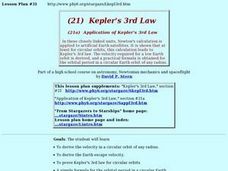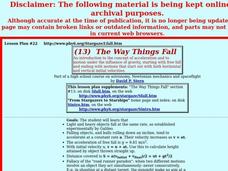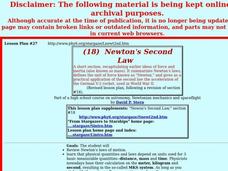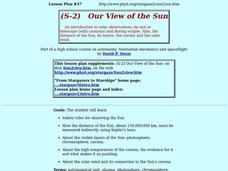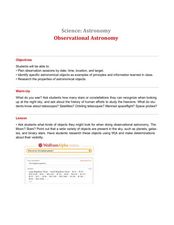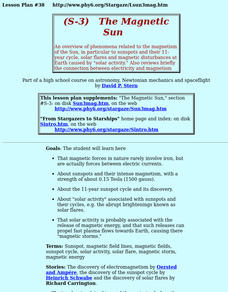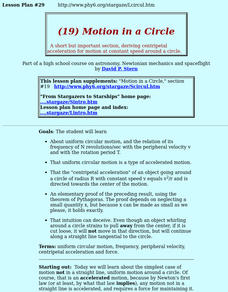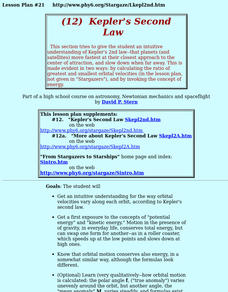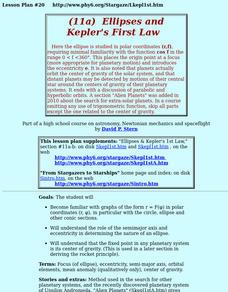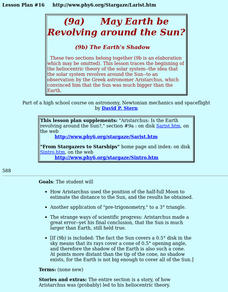Curated OER
Kepler and his Laws
Students examine Kepler's Laws. They confirm Kepler's 3rd law by comparing orbital periods and mean distances for all major planets and study conic sections, qualitatively.
Curated OER
Newton's Theory of Universal Gravitation
Students explore how Newton tied together the gravity observed on Earth and the motion of the Moon. They apply an earlier lesson about centripetal forces.
Curated OER
Kepler's 3rd Law
Learners derive the velocity in a circular orbit of any radius. They derive the Earth escape velocity and prove Kepler's 3rd law for circular orbits # A simple formula for the orbital period in a circular Earth orbit of given radius.
Curated OER
The Way Things Fall
Students explore concept of acceleration and motion under the influence of gravity, starting with free fall and ending with motions that start out with both horizontal and vertical initial velocities.
Curated OER
Newton and his Laws
High schoolers explore Newton's laws, including what they state, and what the intuitive meaning is of the first and third laws.
Curated OER
Newton's Second Law
Students examine how physical quantities and laws depend distance, mass and time. They examine the MKS system; meter, kilogram and second, for doing calculations.
Curated OER
Our View of the Sun
Students are introduced to safety rules for observing the Sun, how the distance of the Sun is measured using Kepler's Laws and identify the visible layers of the Sun. They discuss solar eclipses and view images of eclipses using the...
Curated OER
Milestones in the Space Program
Middle schoolers brainstorm names of astronauts from NASA space missions. They are explained that the Cold War was not actually a war but pervasive tension that existed between the United States and the Soviet Union for several decades...
Curated OER
10 Great Places to Savor the Wild Blue Yonder
Learners discuss developments in aviation. In this reading comprehension lesson, students read an article that discusses ten aviation museums and developments in civil and military aviation. Learners find relationships between pictures...
Curated OER
Forensic Detectives: Chemistry at Work
Students examine the different careers associated with chemistry and see how it is used everyday. In this forensic lesson students research a chemistry related career and write a presentation to give to the class.
Curated OER
Observational Astronomy
Students research about the characteristics of celestial bodies using a database. In this space science lesson, students collect data such as brightness, apparent color and size by observing the night sky. They share their findings with...
Curated OER
Discover Magazine: The Solar System
Students research ideas for NASA's space exploration. For this Space Science lesson plan, students will try to find a way to bring NASA back into the spot light. Students will presented their ideas to the class for review.
Curated OER
Seeing The Sun In A New Light
Young scholars examine the observation of "coronal holes," by x-rays, also about related fast streams and moderate magnetic storms that recur at 27 day intervals. They study NASA'S great observatories.
Curated OER
(S-1) Sunlight and the Earth
Learners discuss the solar heating of the Earth and atmosphere, its heat loss proceses, and the way these relate to weather and climate.
Curated OER
#24 Rotating Frames of Reference in Space and on Earth
Students explore rotating frames of reference, focusing on the weightless environment in space and the Coriolis force.
Curated OER
#22c Airplane flight #22d Airplane flight--How High? How Fast?
Pupils discuss the application of frames of reference to an airplane flying with a constant velocity v through the air.
Curated OER
#22 Frames of Reference: The Basics
Students explore the concept of frames of reference in physics.
Curated OER
Motion in a Circle
Students study about deriving centripetal acceleration for motion at constant speed around a circle.
Curated OER
Kepler's Second Law
Students gain an understanding of Kepler's 2nd law--that planets (and satellites) move fastest at their closest approach to the center of attraction, and slow down when far away. They explore the concepts of "potential energy" and...
Curated OER
Ellipses And Kepler's First Law
Learners explain that planets actually orbit the center of gravity of the solar system, and that distant planets may be detected by motions of their central star around the centers of gravity of their planetary systems.
Curated OER
Graphs And Ellipses
Learners become acquainted with linear graphs, the parabola and the rectangular hyperbola. Also prepare tables of paired values as preparation for plotting a line. They study the cartesian equation of an ellipse, with a worked example.
Curated OER
May The Earth Be Revolving Around The Sun?
Students trace the beginning of the heliocentric theory of the solar system--the idea that the solar system revolves around the Sun--to an observation by the Greek astronomer Aristarchus, which convinced him that the Sun was much bigger...
Curated OER
How Distant is the Moon?--2
Students examine total eclipses of the Sun and their limited regions of totality. They explain that this limited view occurs because the Moon is close enough to us for different points on Earth to view it differently.




